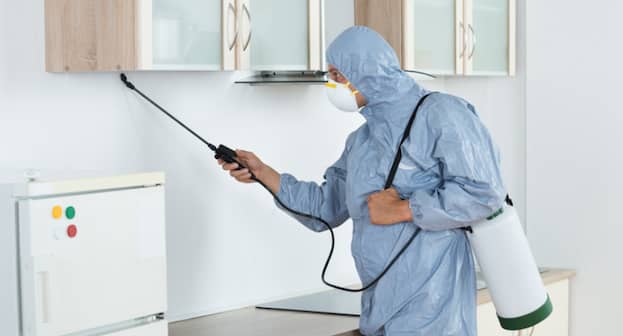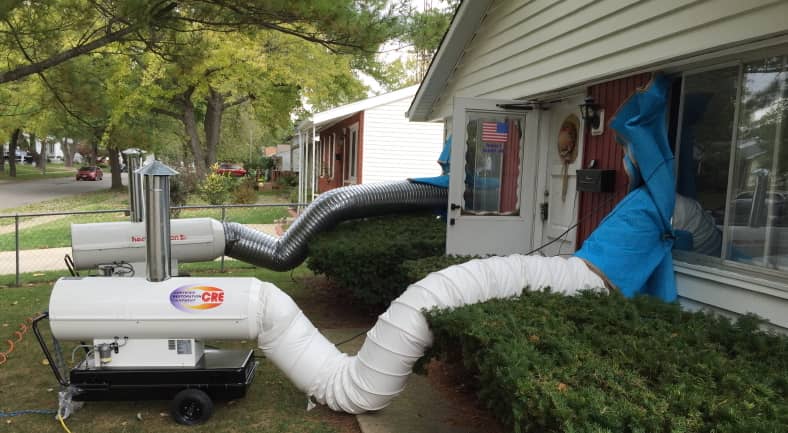You want to know what exactly does a bed bug extermination cost. And if you’re in the midst of a bed bug infestation, that’s a pressing question.
Because bed bugs. Just the name is enough to make brave men shudder.
From the virtual brink of extinction, bed bugs have made an astounding comeback over the last few decades to become one of the most prevalent – and most feared – pest species around.
Partly, this bad reputation comes from the fact that bed bugs bite. In fact, they feed on human blood, and so their life depends on biting people.
But another reason why bed bugs are so feared is because they are extremely difficult to get rid of. If you’re the kind of person that likes to do things for yourself, bed bugs will present a stern challenge, perhaps more so than any other pest.
>>>How to Get Rid of Bed Bugs: Ultimate Guide to DIY Bed Bug Treatment
Even professionals who deal with bed bugs day in and day out admit that clearing a bed bug infestation is one of the trickiest challenges in pest control.
So if you’ve tried to control the problem yourself and nothing seems to be working, don’t beat yourself up about it. Many people have tried and failed to deal with a bed bug infestation by themselves.
There’s no shame in calling in some outside help in the form of a professional exterminator.
But you may be concerned about the cost. Professionals don’t come cheap. It’s tough to get information online as to what bed bug extermination costs, so here’s a rough guide for you to use.
Bear in mind that prices vary A LOT from region to region and country to country. They also vary widely from one company to another.
This is just a rough guide to give you some idea of what the process involves and a ballpark of what you can expect to pay. For more detailed information, call your local exterminators and see if you can get a quote.
Bed Bug Treatment Options: Pesticides
One of the most commonly used bed bug treatment options is, of course, pesticides. In fact, for many years, the pesticide treatment was the standard approach to dealing with bed bugs – and almost every other pest problem.
So much so, in fact, that it remains most people’s image of the pest-control professional: a guy who shows up with a bunch of chemicals and sprays the house for bugs.

Do pesticide treatments for bed bugs work?
Recent years have seen the pest control industry trying to reduce its dependence on chemical insecticides. This is especially important in the case of pests such as bed bugs, which have an incredibly high reproductive rate.
This puts them at high risk of developing resistance to commonly used pesticides. In fact, some bed bug populations have already been found to have resistance to some of the most widely used pesticides, such as synthetic pyrethroids.
That doesn’t mean that pesticides don’t have their place. Spraying for bed bugs is one of the easiest ways to deal with the red menace, and because it’s easy, it tends to fall on the cheapest side of the spectrum of bed bug treatments.
Although commercial pesticides are expensive, they make treatments relatively quick, so that you’re not paying a lot for the technician’s time.
When used correctly, pesticide treatments can most definitely get rid of bed bugs. However, one of the key weaknesses of pesticides is that very few kill bed bug eggs.
What’s the bed bug extermination process using pesticides?
Generally, it’s necessary to do multiple pesticide treatments, usually a week or two apart.
The idea is that this will give any eggs that were killed in the first treatment time to hatch out, but not enough time to become adults before the bug guy comes back to spray them again.
A thorough pesticide treatment will involve the use of multiple pesticides. Not only does this help to combat resistance, but it also means a more thorough treatment.
Liquid insecticides are great for applying around baseboards and underneath furniture, but these aren’t the only places bed bugs can hide.
These sneaky bugs often lurk behind electrical outlets and light switches, and no liquid pesticide should ever be applied in these locations. A dust or powder is a better choice.
The same goes for the bed. Bed bugs got their name for a reason; often, the mattress and bed frame are the most heavily infested locations in a home.
But you don’t want to be sleeping on mattresses that have been treated with a long-lasting pesticide. While any pesticide applied to baseboards and furniture should have a residual effect to kill bedbugs that cross it weeks after the application, anything applied to a bed should break down that day.
That way, you won’t be absorbing pesticide through your skin while you sleep.
While a pesticide treatment is one of the easiest ways to treat bed bugs, that doesn’t make it easy.
A pest control technician will need to go through every inch of your house and treat it all with a variety of pesticides. This takes time. It also requires a lot of preparation on your part.
Most pest control companies will tell you what they need you to do with your clothes and personal possessions before they arrive for the treatment.
Make sure to follow their instructions very carefully. Getting rid of bedbugs is a team effort between you and your exterminator. If you want the treatment to work, you need to do your part to make sure it’s effective.
How much does a bed bug extermination cost for pesticide treatment?
The bed bug extermination cost for a chemical treatment will vary according to the size of your home. You can expect to pay somewhere in the region of $300-$400 for a one-bedroom apartment, and each additional bedroom will add to that cost.
Budget for around $100-$200 for each extra bedroom. Like we said, a bed bug exterminator does not come cheap.
Bed Bug Treatment Options: Heat
Bed bugs die at high temperatures. Anything above 120°F will kill both adult bed bugs and their eggs.
With this in mind, many professional exterminators have turned towards heat as a weapon to combat bed bugs in residential properties.
What’s the bed bug extermination process using heat?
This isn’t a matter of turning up the heat and hoping for the best. To bring an entire house above the temperature required to kill bed bugs, it is necessary to use specialized equipment.

Pest control companies use specially designed heaters and fans to ensure that every part of the house reaches above 120°F and stays there for hours, ensuring that the bed bugs have nowhere to hide.
Done properly, this is an extremely effective way to get rid of bed bugs. And unlike pesticide treatments, there’s no risk of resistance or of harm to your family or the environment from dangerous chemicals.
How much does a bed bug heat treatment cost?
Unfortunately, bed bug heat treatments do not come cheap. They require specialized equipment that can cost hundreds of thousands of dollars.
They also require experienced technicians who will most likely need to spend the entire day at your home, meaning that you will need to pay their wages.
To treat an entire house with heat, expect to pay somewhere in the region of $2000 and up. Yup, the bed bug extermination cost for heat treatment is pricey. And of course, bigger houses and heavier infestations will lead to higher costs.
For this reason, warranties become especially important. You don’t want to spend thousands on a treatment to find it didn’t work.
Ridding a house of bedbugs is a difficult task, and great difficulty means higher expense. For this reason, a lot of people are reluctant to hire a professional bed bug killer and prefer to try to treat their home themselves.
Luckily, there is a lot you can do to combat bed bugs in your home. But if you’ve tried everything else and nothing seems to be working, consider calling in a professional.
It isn’t cheap, but once you’ve spent a few sleepless nights scratching bites and living out of plastic bags, the additional costs may well seem worth it.
